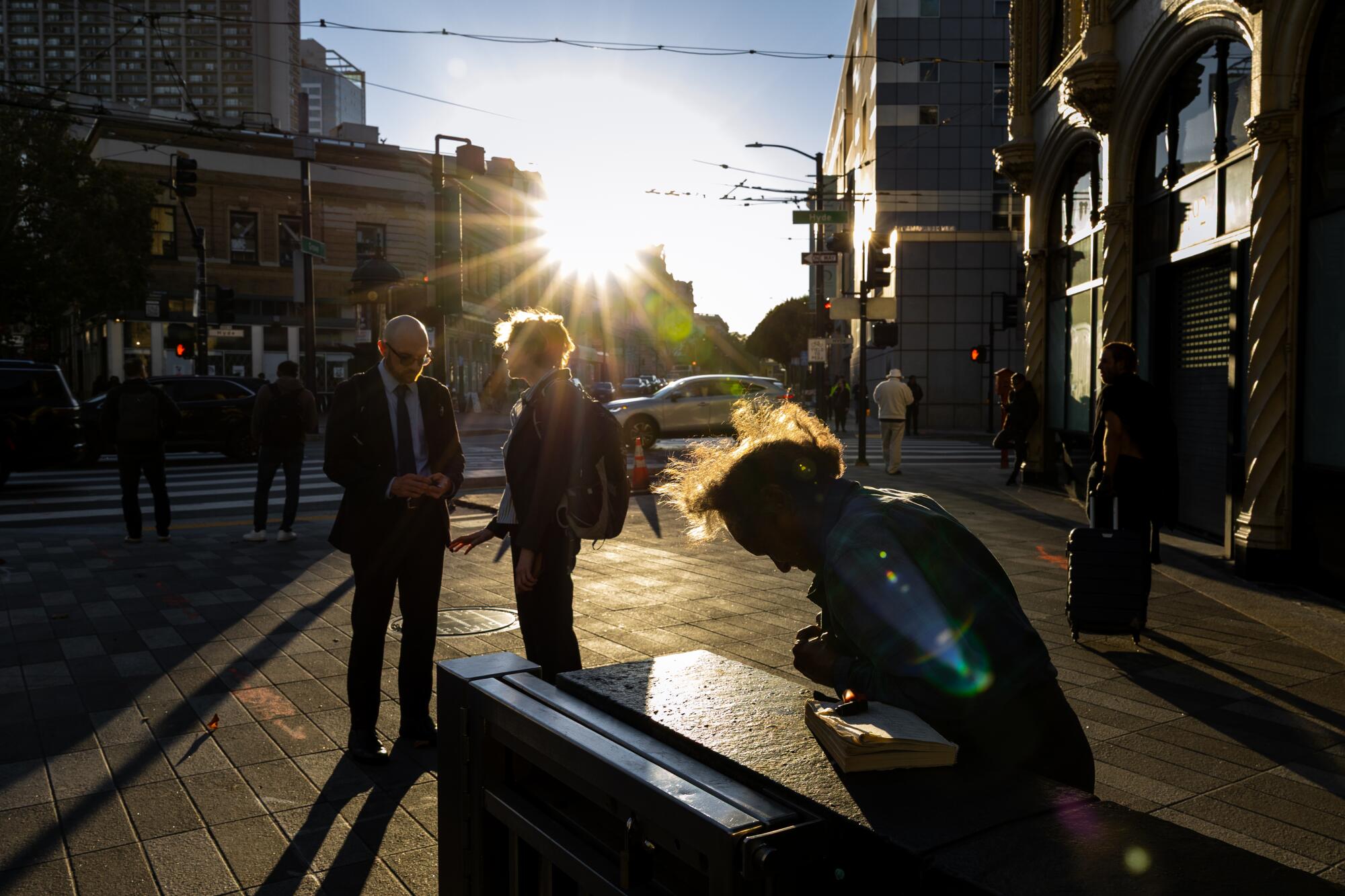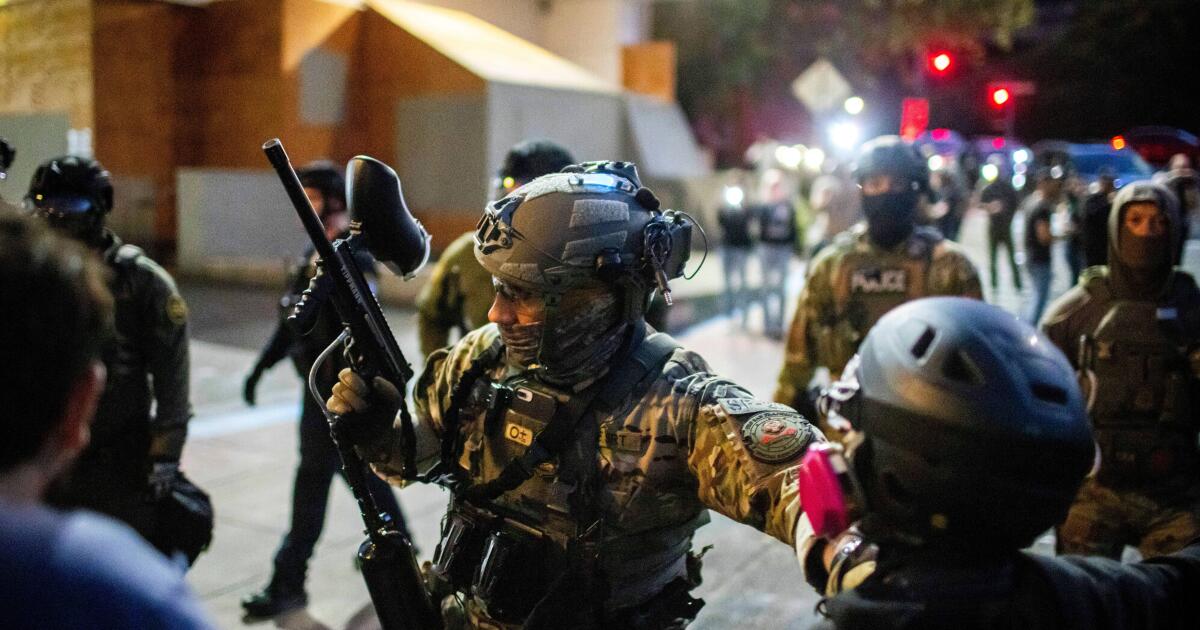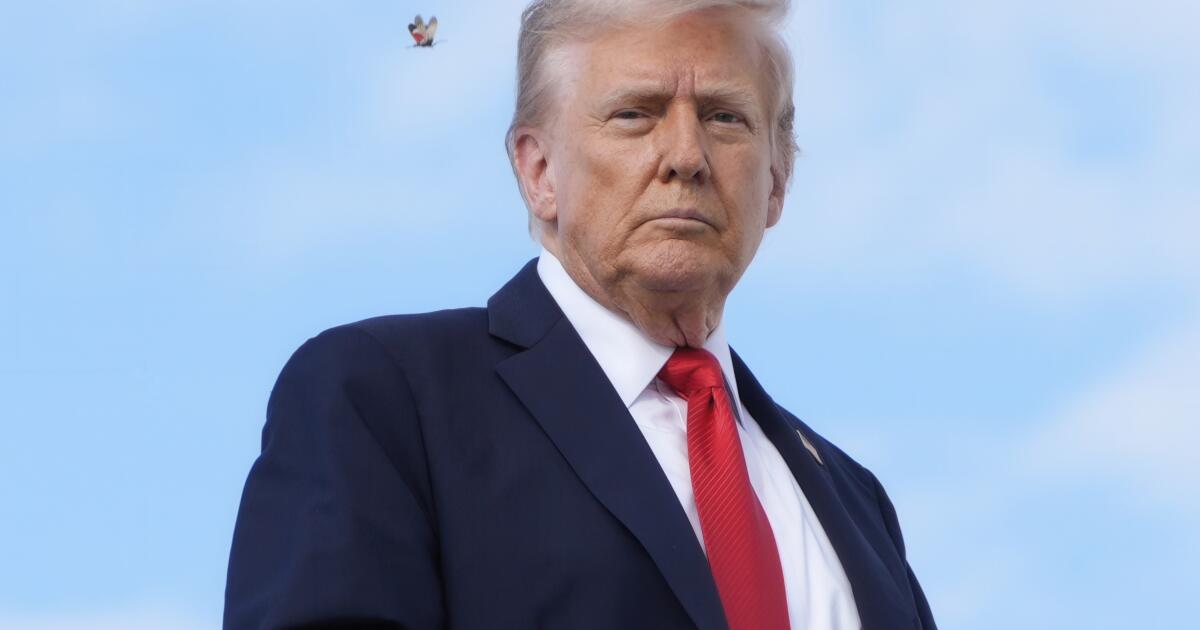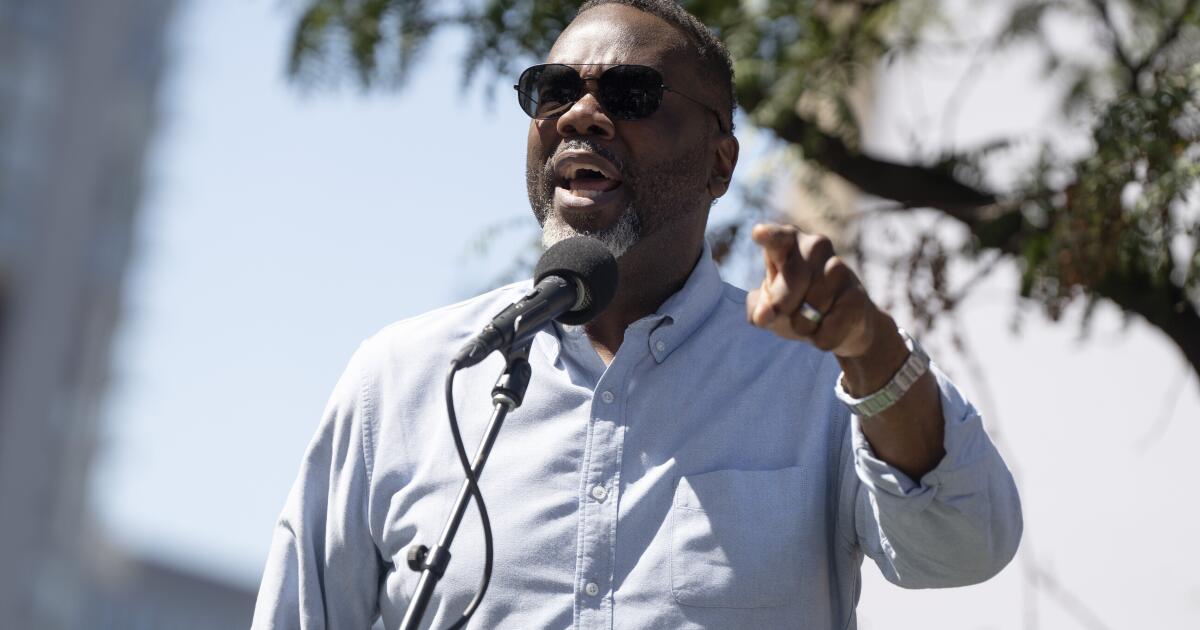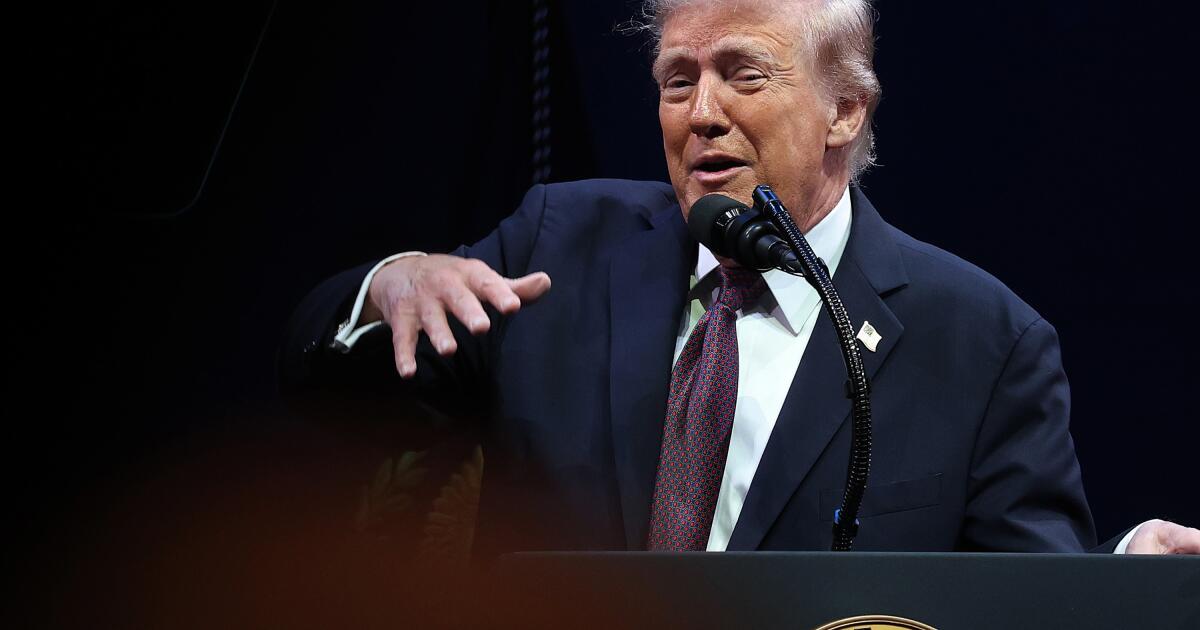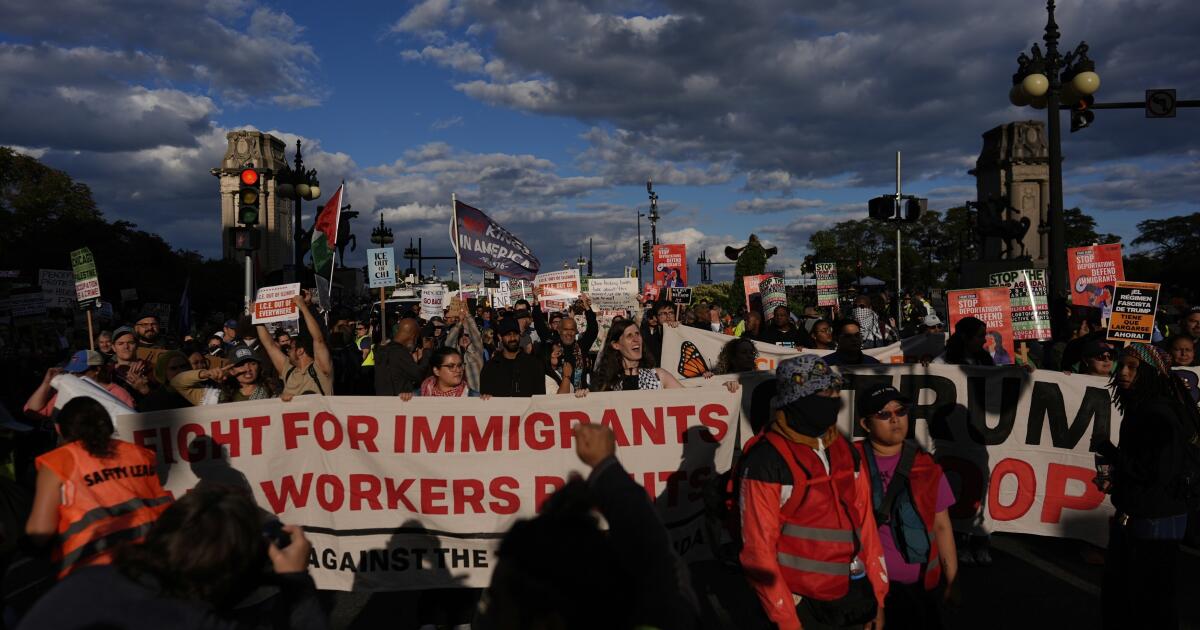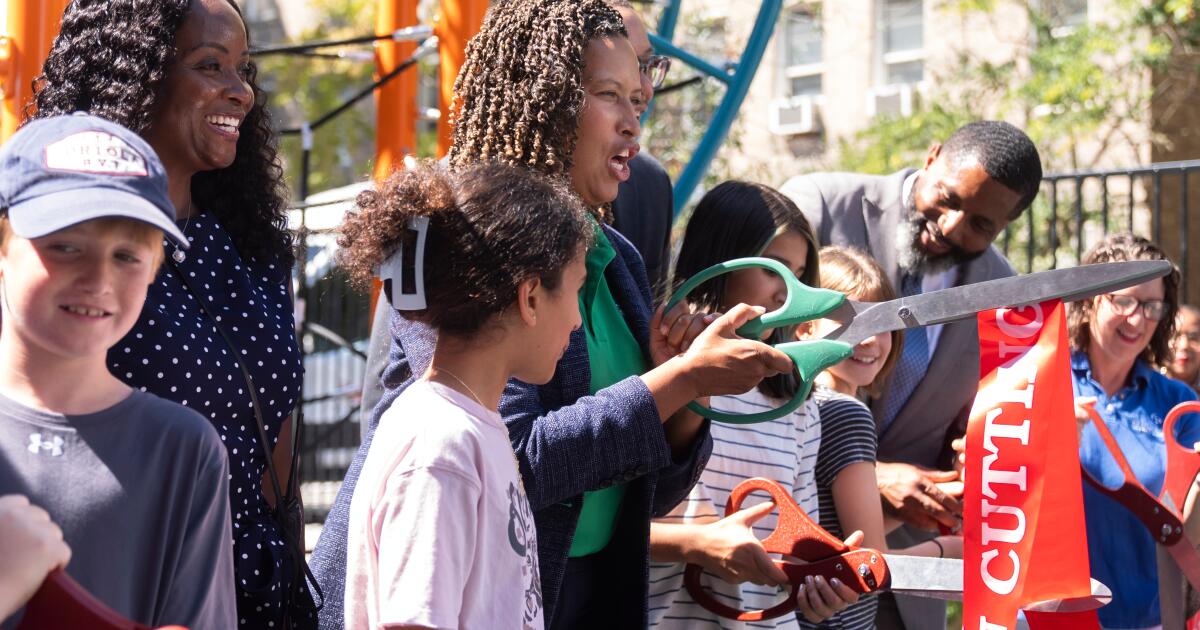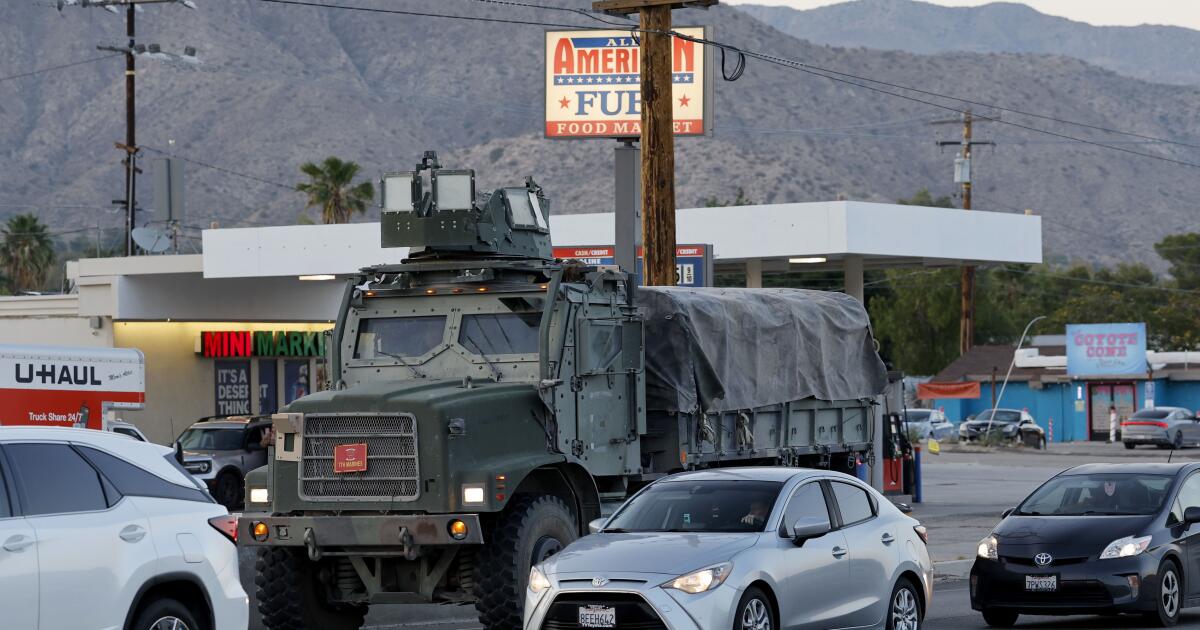Federal troops in San Francisco? Locals, leaders scoff at Trump’s plan
SAN FRANCISCO — About 24 hours after President Trump declared San Francisco such a crime-ridden “mess” that he was recommending federal forces be sent to restore order, Manit Limlamai, 43, and Kai Saetern, 32, rolled their eyes at the suggestion.
The pair — both in the software industry — were with friends Thursday in Dolores Park, a vibrant green space with sweeping views of downtown, playing volleyball under a blue sky and shining autumn sun. All around them, people sat on benches with books, flew kites, played with dogs or otherwise lounged away the afternoon on blankets in the grass.
Both Limlamai and Saetern said San Francisco of course has issues, and some rougher neighborhoods — but that’s any city.
“I’ve lived here for 10 years and I haven’t felt unsafe, and I’ve lived all over the city,” Saetern said. “Every city has its problems, and I don’t think San Francisco is any different,” but “it’s not a hellscape,” said Limlamai, who has been in the city since 2021.
Both said Trump’s suggestion that he might send in troops was more alarming than reassuring — especially, Limlamai said, on top of his recent remark that American cities should serve as “training grounds” for U.S. military forces.
“I don’t think that’s appropriate at all,” he said. “The military is not trained to do what needs to be done in these cities.”
Across San Francisco, residents, visitors and prominent local leaders expressed similar ideas — if not much sharper condemnation of any troop deployment. None shied away from the fact that San Francisco has problems, especially with homelessness. Several also mentioned a creeping urban decay, and that the city needs a bit of a polish.
But federal troops? That was a hard no.
A range of people on Market Street in downtown San Francisco on Thursday.
“It’s just more of [Trump’s] insanity,” said Peter Hill, 81, as he played chess in a slightly edgier park near City Hall. Hill said using troops domestically was a fascist power play, and “a bad thing for the entire country.”
“It’s fascism,” agreed local activist Wendy Aragon, who was hailing a cab nearby. Her Latino family has been in the country for generations, she said, but she now fears speaking Spanish on the street given that immigration agents have admitted targeting people who look or sound Latino, and troops in the city would only exacerbate those fears. “My community is under attack right now.”
State Sen. Scott Wiener (D-San Francisco) said troop deployments to the city were “completely unnecessary” and “typical Trump: petty, vindictive retaliation.”
“He wants to attack anyone who he perceives as an enemy, and that includes cities, and so he started with L.A. and Southern California because of its large immigrant community, and then he proceeded to cities with large Black populations like Chicago, and now he’s moving on to cities that are just perceived as very lefty like Portland and now San Francisco,” Wiener said.
Abigail Jackson, a White House spokesperson, defended such deployments and noted crime reductions in cities, including Washington, D.C., and Memphis, where local officials — including D.C. Mayor Muriel Bowser, a Democrat — have embraced them.
“America’s once great cities have descended into chaos and crime as a result of Democrat policies that put criminals first and law-abiding citizens last. Making America Safe Again — especially crime-ridden cities — was a key campaign promise from the President that the American people elected him to fulfill,” Jackson said. “San Francisco Democrats should look at the tremendous results in DC and Memphis and listen to fellow Democrat Mayor Bowser and welcome the President in to clean up their city.”
A police officer shuts the door to his car after a person was allegedly caught carrying a knife near a sign promoting an AI-powered museum exhibit in downtown San Francisco.
A presidential ‘passion’
San Francisco — a bastion of liberal politics that overwhelmingly voted against Trump in the last election — has been derided by the conservative right for generations as a great American jewel lost to destructive progressive policies.
With its tech-heavy economy and downtown core hit hard by the pandemic and the nation’s shift toward remote work, the city has had a particularly rough go in recent years, which only exacerbated its image as a city in decline. That it produced some of Trump’s most prominent political opponents — including Gov. Gavin Newsom and former Vice President Kamala Harris — has only made it more of a punching bag.
In August, Trump suggested San Francisco needed federal intervention. “You look at what the Democrats have done to San Francisco — they’ve destroyed it,” he said in the Oval Office. “We’ll clean that one up, too.”
Then, earlier this month, to the chagrin of liberal leaders across the city, Marc Benioff, the billionaire Salesforce founder and Time magazine owner who has long been a booster of San Francisco, said in an interview with the New York Times that he supported Trump and welcomed Guard troops in the city.
“We don’t have enough cops, so if they can be cops, I’m all for it,” Benioff said, just as his company was preparing to open its annual Dreamforce convention in the city, complete with hundreds of private security officers.
The U.S. Constitution generally precludes military forces from serving in police roles in the U.S.
On Friday, Benioff reversed himself and apologized for his earlier stance. “Having listened closely to my fellow San Franciscans and our local officials, and after the largest and safest Dreamforce in our history, I do not believe the National Guard is needed to address safety in San Francisco,” he wrote on X.
He also apologized for “the concern” his earlier support for troops in the city had caused, and praised San Francisco’s new mayor, Daniel Lurie, for bringing crime down.
Billionaire Elon Musk, the chief executive of Tesla, also called for federal intervention in the city, writing on his X platform that downtown San Francisco is “a drug zombie apocalypse” and that federal intervention was “the only solution at this point.”
Trump made his latest remarks bashing San Francisco on Wednesday, again from the Oval Office.
Trump said it was “one of our great cities 10 years ago, 15 years ago,” but “now it’s a mess” — and that he was recommending federal forces move into the city to make it safer. “I’m gonna be strongly recommending — at the request of government officials, which is always nice — that you start looking at San Francisco,” he said to leading members of his law enforcement team.
Trump did not specify exactly what sort of deployment he meant, or which kinds of federal forces might be involved. He also didn’t say which local officials had allegedly requested help — a claim Wiener called a lie.
“Every American deserves to live in a community where they’re not afraid of being mugged, murdered, robbed, raped, assaulted or shot, and that’s exactly what our administration is working to deliver,” Trump said, before adding that sending federal forces into American cities had become “a passion” of his.
Kai Saetern, 32, was playing volleyball in Dolores Park on Thursday. Saetern said he has never felt unsafe living in neighborhoods all over the city for the last 10 years.
Crime is down citywide
The responses from San Francisco, both to Benioff and Trump, came swiftly, ranging from calm discouragement to full-blown outrage.
Lurie did not respond directly, but his office pointed reporters to his recent statements that crime is down 30% citywide, homicides are at a 70-year low, car break-ins are at a 22-year low and tent encampments are at their lowest number on record.
“We have a lot of work to do,” Lurie said. “But I trust our local law enforcement.”
San Francisco Dist. Atty. Brooke Jenkins was much more fiery, writing online that Trump and Homeland Security Secretary Kristi Noem had turned “so-called public safety and immigration enforcement into a form of government sponsored violence against U.S. citizens, families, and ethnic groups,” and that she stood ready to prosecute federal officers if they harm city residents.
Attendees exit the Dreamforce convention downtown on Thursday in San Francisco.
“If you come to San Francisco and illegally harass our residents … I will not hesitate to do my job and hold you accountable just like I do other violators of the law every single day,” she said.
Rep. Nancy Pelosi (D-San Francisco) — whose seat Wiener is reportedly going to seek — said the city “does not want or need Donald Trump’s chaos” and will continue to increase public safety locally and “without the interference of a President seeking headlines.”
Newsom said the use of federal troops in American cities is a “clear violation” of federal law, and that the state was prepared to challenge any such deployment to San Francisco in court, just as it challenged such deployments in Los Angeles earlier this year.
The federal appellate court that oversees California and much of the American West has so far allowed troops to remain in L.A., but is set to continue hearing arguments in the L.A. case soon.
Trump had used anti-immigration enforcement protests in L.A. as a justification to send troops there. In San Francisco, Newsom said, he lacks any justification or “pretext” whatsoever.
“There’s no existing protest at a federal building. There’s no operation that’s being impeded. I guess it’s just a ‘training ground’ for the President of United States,” Newsom said. “It is grossly illegal, it’s immoral, it’s rather delusional.”
Nancy DeStefanis, 76, a longtime labor and environmental activist who was at San Francisco City Hall on Thursday to complain about Golden Gate Park being shut to regular visitors for paid events, was similarly derisive of troops entering the city.
“As far as I’m concerned, and I think most San Franciscans are concerned, we don’t want troops here. We don’t need them,” she said.
Passengers walk past a cracked window from the Civic Center BART station in downtown San Francisco.
‘An image I don’t want to see’
Not far away, throngs of people wearing Dreamforce lanyards streamed in and out of the Moscone Center, heading back and forth to nearby Market Street and pouring into restaurants, coffee shops and take-out joints. The city’s problems — including homelessness and associated grittiness — were apparent at the corners of the crowds, even as chipper convention ambassadors and security officers moved would-be stragglers along.
Not everyone was keen to be identified discussing Trump or safety in the city, with some citing business reasons and others a fear of Trump retaliating against them. But lots of people had opinions.
Sanjiv, a self-described “techie” in his mid-50s, said he preferred to use only his first name because, although he is a U.S. citizen now, he emigrated from India and didn’t want to stick his neck out by publicly criticizing Trump.
He called homelessness a “rampant problem” in San Francisco, but less so than in the past — and hardly something that would justify sending in military troops.
“It’s absolutely ridiculous,” he said. “It’s not like the city’s under siege.”
Claire Roeland, 30, from Austin, Texas, said she has visited San Francisco a handful of times in recent years and had “mixed” experiences. She has family who live in surrounding neighborhoods and find it completely safe, she said, but when she’s in town it’s “predominantly in the business district” — where it’s hard not to be disheartened by the obvious suffering of people with addiction and mental illness and the grime that has accumulated in the emptied-out core.
“There’s a lot of unfortunate urban decay happening, and that makes you feel more unsafe than you actually are,” she said, but there isn’t “any realistic need to send in federal troops.”
She said she doesn’t know what troops would do other than confront homeless people, and “that’s an image I don’t want to see.”
Times staff writer Dakota Smith contributed to this report.
